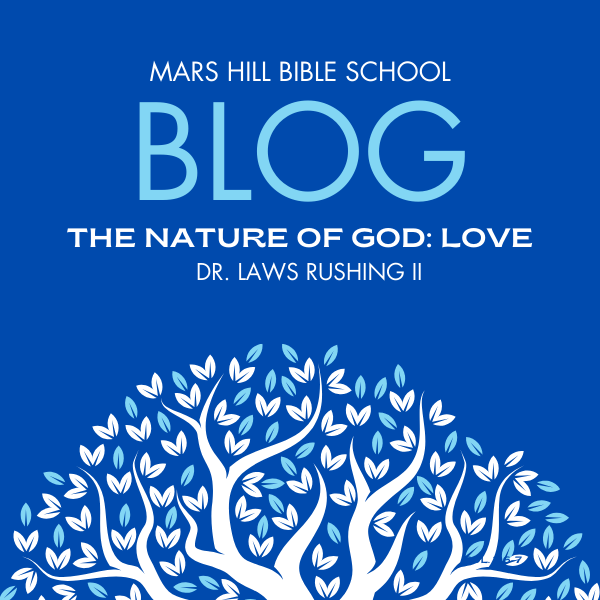MHBS Blog
The Nature of God: Love

“But above all these things put on love, which is the bond of perfection.”
The grandest question of the universe is beyond the reach of science and appears to be inexplicable. The question of why? The Bible gives a concise answer to this difficult quandary and is found in the answer of love, which is the summum bonum of the cosmos (I Corinthians 13). Love itself cannot exist in a vacuum but is found in a relation and ultimately God’s love is sourced within the eternal relation of the triune God: Father, Son, and Holy Spirit. God’s love is eternal and found within His own very nature and being.
The Bible speaks of the love of God. (I John 4:8, 16) “He who does not love does not know God, for God is love. And we have known and believed the love that God has for us. God is love, and he who abides in love abides in God, and God in him.” God is also described as “first love” (I John 4: 19), which means that his love is unconditional and shaped by His own character and not by our merit or utility. As CS Lewis observed, “God loves us not because we are loveable but because He is love.”
The expression of God’s love has manifested itself through a covenantal relationship and faithfulness. The Hebrew word hesed has been used over 250 times in the Old Testament. It is sometimes translated as lovingkindness, steadfast love or mercy. “And the Lord passed before him and proclaimed, “The Lord, the Lord God, merciful (hesed) and gracious, longsuffering, and abounding in goodness and truth, keeping mercy (hesed) for thousands, forgiving iniquity and transgression and sin, by no means clearing the guilty, visiting the iniquity of the fathers upon the children and the children’s children to the third and the fourth generation.” (Exodus 34: 6,7).
Hear the words of the Psalmist (chapter 136), who praises God for His steadfast love or eternal mercy (hesed) repeatedly.
“Oh, give thanks to the Lord, for He is good!
For His mercy endures forever.
Oh, give thanks to the God of gods!
For His mercy endures forever.
Oh, give thanks to the Lord of lords!
For His mercy endures forever:
To Him who alone does great wonders,
For His mercy endures forever;
To Him who by wisdom made the heavens,
For His mercy endures forever;
To Him who laid out the earth above the waters,
For His mercy endures forever;
To Him who made great lights,
For His mercy endures forever—
The sun to rule by day,
For His mercy endures forever; The moon and stars to rule by night”
There are also philosophical considerations when it comes to God’s love called ethics. A worldview without God or Christian love is one without ethical grounding. Many thinkers have come to grips with this painful and unlivable conclusion. The often-quoted novelist Dostoevsky, “If there is no God, everything is permitted.” God’s character of holiness and goodness are the locus of ethical standards, and His love is the transcendent ethical value placed in humanity by His creative and redemptive acts. God’s character and love makes sense of our consciences, moral obligations to each other and society.
The concept of love is not so much a feeling or attraction but an ethic. The Bible speaks of God’s love as the foundation of our own beneficent and loving behavior. (I John 4: 11-13) “Beloved, if God so loved us, we also ought to love one another. No one has seen God at any time. If we love one another, God abides in us, and His love has been perfected in us. By this we know that we abide in Him, and He in us, because He has given us of His Spirit.” Furthermore, “If someone says, ‘I love God,’ and hates his brother, he is a liar; for he who does not love his brother whom he has seen, how can he love God whom he has not seen? And this commandment we have from Him: that he who loves God must love his brother also” (I John 4:20, 21).
Jesus taught that we must love universally and as He loves us. “A new commandment I give to you, that you love one another; as I have loved you, that you also love one another. By this all will know that you are My disciples, if you have love for one another” (John 13:34, 35). The commandment is not limited but even extended to enemies. Jesus preached, “You have heard that it was said, ‘You shall love your neighbor and hate your enemy.’ But I say to you, love your enemies, bless those who curse you, do good to those who hate you, and pray for those who spitefully use you and persecute you, that you may be sons of your Father in heaven; for He makes His sun rise on the evil and on the good, and sends rain on the just and on the unjust. For if you love those who love you, what reward have you? Do not even the tax collectors do the same? And if you greet your brethren only, what do you do more than others? Do not even the tax collectors do so? Therefore you shall be perfect, just as your Father in heaven is perfect.” (Matthew 5:43-48).
God’s love finds its greatest covenantal expression in the amazing life, atoning death, and resurrection of Jesus Christ. (I John 4: 9,10) “In this the love of God was manifested toward us, that God has sent His only begotten Son into the world, that we might live through Him. In this is love, not that we loved God, but that He loved us and sent His Son to be the propitiation for our sins.”
The old hymn poetically summarizes the depths and immensity of God’s love.
Could we with ink the ocean fill,
And were the skies of parchment made;
Were every stalk on earth a quill,
And every man a scribe by trade;
To write the love of God above
Would drain the ocean dry;
Nor could the scroll contain the whole,
Though stretched from sky to sky.


.png)
